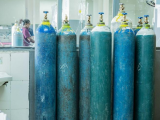Alarmed by persistent shortages of critically important drugs such as cancer medications, Adderall, and antibiotics, US policymakers are taking steps to shore up the country's pharmaceutical supply chains.
Recently, Senators Gary Peters (D-Michigan) and Joni Ernst (R-Iowa) proposed legislation to identify the country's pharmaceutical supply chain weaknesses and reduce its reliance on China for drugs and drug ingredients.
The legislation, called the Pharmaceutical Supply Chain Risk Assessment Act, would require the Department of Homeland Security, the Department of Defense, the Department of Health and Human Services, and the White House Office of Pandemic Preparedness and Response Policy to conduct a risk assessment and create a plan to address long-standing drug-supply issues.
But reducing dependencies will be complicated. The Food and Drug Administration (FDA) said early this month that it had resorted to permitting the import of the chemotherapy drug cisplatin from China, even though it is not approved in the United States. The FDA said it was also considering importing another platinum-based cancer drug, carboplatin, from China.
Import of unapproved drugs a 'temporary relief'
David Margraf, PharmD, PhD, pharmaceutical research scientist at the Resilient Drug Supply Project (RDSP), said that the import of non–FDA-approved drugs to alleviate shortages is a temporary relief for strained drug supply chains.
The legislation would require the Department of Homeland Security, the Department of Defense, the Department of Health and Human Services, and the White House Office of Pandemic Preparedness and Response Policy to conduct a risk assessment and create a plan to address long-standing drug-supply issues.
"These drugs come from facilities that are not inspected by the FDA for quality control, so it is important to consider the potential risks to patients due to the increased likelihood of compromised safety and efficacy," he said. RDSP is part of the University of Minnesota's Center for Infectious Disease Research and Policy (CIDRAP), publisher of CIDRAP News.
According to Margraf, the underlying structural problems with the US drug supply stem from market factors that favor low-cost production at the expense of quality and consistent availability. "Cost considerations of generic drug production play a significant role, which has led to a complex and convoluted global market," he said. "The pursuit of low-cost production has led to outsourcing manufacturing to countries with lower production costs and less stringent regulatory standards."
The FDA has the unenviable task of enforcing drug quality standards, Margraf added. "There is a need for comprehensive strategies that balance the need for affordable medications with stringent quality control measures," he said. "Efforts must promote transparency, accountability, and collaboration among stakeholders with in the pharmaceutical market to ensure the availability of high-quality drugs at reasonable prices."
An issue the world over
The American Society of Health-System Pharmacists has more than 900 drug and dose shortages on its drug shortage list, and the FDA lists more than 200. The number and length of supply disruptions has grown over the last 10 years, according to a March 2023 letter from Congress to FDA Commissioner Robert Califf, MD. "New drug shortages in the country saw a 30 percent increase from 2021 to 2022, posing a risk to public health and national security," the letter said.
A June 15 news release from Ernst's office said that 80% of active pharmaceutical ingredients come to the United States from overseas, a national security risk in the event of a national or world crisis.
"This bipartisan legislation will provide the federal government with a better understanding of how our over-reliance on foreign nations for critical drugs threatens our military readiness and creates health risks for Americans," Peters said in the release.
The move comes on the heels of other policymaker actions to strengthen drug supply chains. Earlier this month, the House Energy and Commerce health subcommittee met to start negotiations to reauthorize the Pandemic and All-Hazards Preparedness Act, which would give the FDA more authority to require that drug manufacturers notify it of supply chain problems.
Drug scarcities are not unique to the United States, with European officials expressing concern about ongoing antibiotic shortages. For example, in mid-June, French President Emmanual Macron said he was seeking to onshore the manufacture of key pharmaceutical products and ingredients to avert future shortages.




















